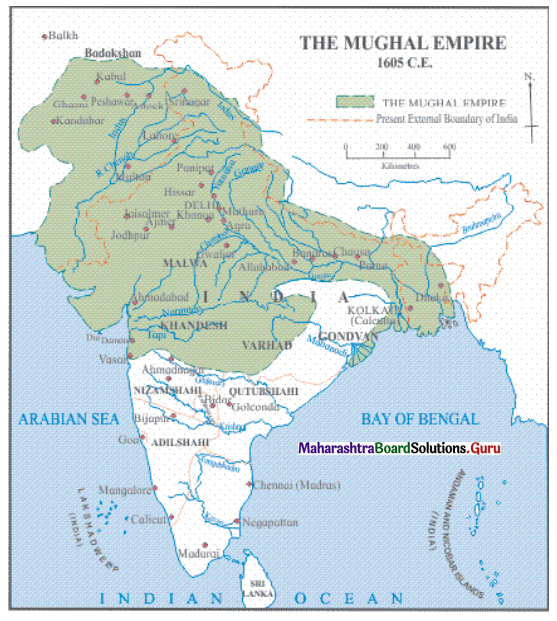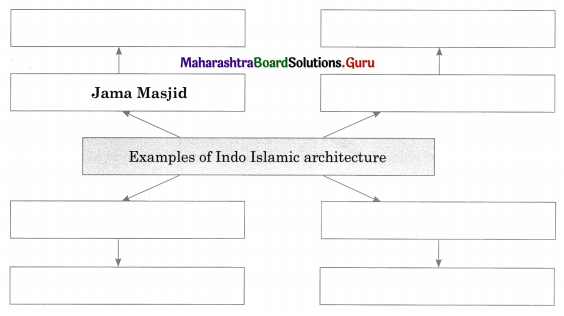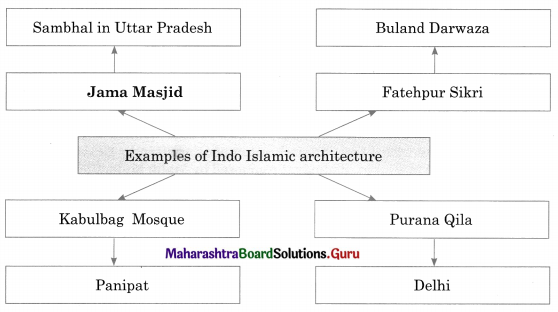Balbharti Maharashtra State Board Class 11 History Important Questions Chapter 15 India During Mughal Period Important Questions and Answers.
Maharashtra State Board 11th History Important Questions Chapter 15 India During Mughal Period
1A. Choose the correct alternative and write the complete sentences.
Question 1.
___________ was the king of Farghana province in Central Asia.
(a) Taimurlang
(b) Babur
(c) Genghis khan
(d) Akbar
Answer:
(b) Babur
Question 2.
After Humayun, his son ___________ ascended the throne.
(a) Babur
(b) Aurangzeb
(c) Akbar
(d) Shershah
Answer:
(c) Akbar
![]()
Question 3.
Rana Pratap was the ruler of ___________
(a) Mewar
(b) Jodhpur
(c) Jaipur
(d) Bundelkhand
Answer:
(a) Mewar
Question 4.
Baburnama was written by ___________
(a) Akbar
(b) Birbal
(c) Babur
(d) Jahangir
Answer:
(c) Babur
Question 5.
The Taj Mahal was built by ___________
(a) Babur
(b) Akbar
(c) Shahajahan
(d) Jahangir
Answer:
(c) Shahjahan
Question 6.
___________ was a Sanskrit scholar.
(a) Dara Shukoh
(b) Aurangzeb
(c) Shah Shuja
(d) Murad Baksh
Answer:
(a) Dara Shukoh
![]()
1B. Find the incorrect pair from set B and write the correct ones.
Question 1.
| Set ‘A’ | Set ‘B’ |
| (a) Tombs of Salim Chisti | Fatehpur Sikri |
| (b) Kabulbag mosque | Panipat |
| (c) Jama Masjid | Sambhal |
| (d) Purana Qila | Ajmer |
Answer:
(d) Purana Qila – Delhi
Question 2.
| Set ‘A’ | Set ‘B’ |
| (a) Fertile | Stupik |
| (b) Infertile | Napik |
| (c) Irrigated | Bagayat |
| (d) Dry crop | Jiyarat |
Answer:
(a) Fertile – Supik
1C. Find the odd one out.
Question 1.
Diwan-i-Aam, Diwan-i-Khaas Jama Masjid, Kutub Minar
Answer:
Kutub Minar
Question 2.
Surat, Dabhol, Agra, Calicut
Answer:
Agra
Question 3.
Rajatarangini, Lilavati, Ramayana, Ramacharitamanas
Answer:
Ramacharitamanas
Question 4.
Pahari, Basauli, Gadhwali, Kangra
Answer:
Pahari
2A. Write the names of historical places, persons, and events.
Question 1.
Documents prepared after the fixing of the tax rate.
Answer:
Kabulayat and Patta
![]()
Question 2.
He translated Upanishads texts in the Persian language from Sanskrit.
Answer:
Dara
Question 3.
He was born in Uzbekistan.
Answer:
Babur
Question 4.
After Humayun, his son ascended the throne.
Answer:
Akbar
2B. Choose the correct reason and complete the sentence.
Question 1.
The Mughals ruled over India for more than ___________
(a) four centuries
(b) two centuries
(c) one centuries
(d) three centuries
Answer:
(d) three centuries
Question 2.
The grand army of Ibrahim Lodi could not survive in front of ___________
(a) Babur, in the battle of Panipat
(b) Babur, Battle of Khanwa
(c) Rana Pratap, the ruler of Mewar
(d) Humayun’s son Akbar
Answer:
(a) Babur, in the battle of Panipat
2C. Write the correct chronological order.
Question 1.
(a) Babur established his rule in Delhi.
(b) Babur’s son Humayun ascended the throne.
(c) Babur defeated Ibrahim Lodi.
(d) Babur defeated Rajputs in the Battle of Khanwa.
Answer:
(a) Babur defeated Ibrahim Lodi.
(b) Babur established his rule in Delhi.
(c) Babur defeated Rajputs in Battle of Khanwa
(d) Babur’s son Humayun ascended the throne.
![]()
2D. Complete the table.
Question 1.
| 1.Tarikh-i-Rashidi | …………………………….. |
| 2. …………………….. | Khafi Khan |
| 3. Translation of Upanishads in Persian | …………………………….. |
| 4. ……………………….. | 4. Malik Muhammad Jayasi |
Answer:
| 1. Tarikh-i-Rashidi | Mirza Hyder |
| 2. Tarikh-i-Khafikhan | Khafi Khan |
| 3. Translation of Upanishads in Persian | Dara Shukoh |
| 4. Padmavat | Malik Muhammad Jayasi |
Question 2.
| Ruler | Buildings Built |
| 1. Babar | ………………………….. |
| 2. ………………… | TajMahal |
| 3. Akbar | …………………………. |
| 4. …………………. | Memorial at Sahastram (Bihar) |
Answer:
| Ruler | Buildings Built |
| 1. Babar | Kabulbag Mosque |
| 2. Shahjahan | TajMahal |
| 3. Akbar | Buland Darwaza |
| 4. Shershah Sur | Memorial at Sahastram (Bihar) |
3. Observe the map on page 111 of your textbook and answer the following questions based on it.

Question 1.
Name the kingdoms in Maharashtra during medieval times.
Answer:
Mughals, Adilshahi, Nizamshahi
Question 2.
Name the rivers in Maharashtra.
Answer:
Narmada, Tapi, Godavari
Question 3.
Name the islands shown on a map.
Answer:
Lakshadweep and Andaman and the Nicobar Islands
Question 4.
Name the ocean at the tip of India.
Answer:
Indian Ocean
![]()
Question 5.
Name the sea shown on a map.
Answer:
Arabian Sea
4. Complete the concept maps.
Question 1.

Answer:

Question 2.

Answer:

Question 3.

Answer:

5. Explain the following statements with reasons.
Question 1.
For the expansion of the empire, Akbar adopted the strategy of persuasion with the Rajputs.
Answer:
- Akbar faced many internal and external problems when he started his rule. Mughal power was not completely established and it was vulnerable to attacks.
- During this period, Rana Pratap, the ruler of Mewar, put up a strong resistance against Akbar. Akbar could never win a war with Rana Pratap.
- Hence for the expansion of the empire, he adopted the strategy of persuasion with the Rajputs.
- Akbar had realized that if the Mughal rule has to be strengthened in India then he had to adopt non-offensive policies, which would be popular.
![]()
Question 2.
Mughal Empire declined.
Answer:
- After Akbar, Jahangir, Shahjahan, and Aurangzeb ruled efficiently.
- Aurangzeb attempted to expand his empire in the Deccan with prolonged campaigns. There was a toll on the economic status of the Mughals. The campaign in the south drained huge wealth from the Mughal treasury.
- Aurangzeb’s reign is notable for his wars in frontier provinces, his political policies in North and South India, staunch religious policies, and the Mughal- Maratha conflict. All these things ultimately resulted in the decline of Mughal power.
- This period is marked by the expansion of the Maratha kingdom, interference by the Europeans in the political affairs of India, and the decline of Mughal power.
- Finally, the aftermath of the struggle for Independence in 1857 C.E., saw the end of the Mughal rule under Bahadur Shah.
Question 3.
Akbar’s administration was welfare-oriented.
Answer:
- An average of the annual yield in the last ten years was calculated and one-third of this average yield was fixed as the base for the tax to be paid.
- The tax, thus fixed, was applicable for the span of ten years. This offered considerable respite to farmers for a span of ten years.
- Documents are known as ‘Kabulayat’ and ‘Patta’ were prepared from the farmers after the fixing of the tax rate. The tax was collected in cash or in kind.
- The farmers have sanctioned loans for tilling the land, which could be repaid in installments.
- Concessions were also granted to the farmers during times of calamities like famine, floods, and epidemics. These were the Welfare policies of Emperor Akbar.
- Todarmal in Emperor Akbar’s court is known for his insights regarding the welfare of common people.
6. State your opinion.
Question 1.
Arts flourished during the period of the Mughals.
Answer:
- The reign of the three emperors, Akbar, Jahangir, and Shahjahan was a period of peace, order, and prosperity. Arts flourish when there is stability.
- A new era began in the field of art and architecture. The etched designs on the marble walls of mosques, tombs, and palaces are evidence of the highly advanced styles of art and architecture.
- During the period of Akbar and Jahangir, the art of ivory carving received royal patronage.
- The Mughal paintings originated from the Persian styles of painting.
- There are miniature paintings of Persian style in the manuscript of ‘Baburnama’. The art of painting received encouragement during the period of Akbar. He appointed skilled painters in his court.
- During the period of Jahangir, paintings were done based on the court and hunting scenes. The paintings of this period were done in a more realistic style, which is vibrant and attractive. These paintings, portray birds and animals, cloud formations, human figures, and natural scenery.
- During the Mughal period, the art of music seems to have received royal patronage.
Question 2.
Mughals could establish their rule in India.
Answer:
- At the beginning of the 16th century, the political condition in India was somewhat disturbed.
- The Sultanate’s rule had begun to decline after Muhammad Tughluq. The Delhi Sultanate broke down completely and many new independent kingdoms emerged in North, Central, and South India.
- The Bahamani kingdom got divided into five branches. The prosperous Vijaynagar empire was’ destroyed by the five Islamic ruling houses in the South.
- During the same period, the Portuguese began to settle on the western coast of India. The traditional military system of the Indian rulers in the medieval period was not capable of facing the onslaught of new challenges.
- The Indians were not familiar with modern weaponry. Taking advantage of all this, the Mughals established their rule in India.
![]()
Question 3.
India received silver every year in large quantities.
Answer:
- Foreign trade flourished to a great extent during the Mughal period.
- Exports from India were larger than the imports.
- Many commodities including silk cloth, precious stones, spices, etc. were exported from India while the imported goods mainly included luxury items.
- The foreign traders had to pay for the Indian goods in the form of silver.
- Hence, India received silver every year in large quantities.
7. Answer the following questions with the help of given points.
Question 1.
Write in detail about Mughal Land Revenue System.
(a) Land Survey
(b) Rate of Tax
(c) Welfare Oriented Policy
Answer:
(a) Land Survey:
- Akbar made further reforms in the revenue system implemented by Shershah Sur. This bought a certain discipline in the Mughal revenue system.
- He graded the cultivable land based on the systematic land survey. The land was classified into four types on the basis of annual yield, i.e. fertile (supik), infertile (napik), irrigated (bagayat), and dry crop (jirayat) land.
(b) Rate of Tax:
- Individual land holdings of farmers were registered. An average of the annual yield in the last ten years was calculated and one-third of this average yield was fixed as the base for the tax to be paid.
- The tax, thus fixed, was applicable for the span of ten years. This offered considerable respite to farmers for a span of ten years. Documents knew as ‘Kabulayat’ and ‘Patta’ were prepared by the farmers after the fixing of the tax rate.
![]()
(c) Welfare Oriented Policy:
- The tax was collected in cash or in kind. The farmers have sanctioned loans for tilling the land, which could be repaid in installments.
- Concessions were also granted to the farmers during times of calamities like famine, floods, and epidemics. These were the Welfare policies of Emperor Akbar.
- Todarmal in emperor Akbar’s court is known for his insights regarding the welfare of common people. His insights were instrumental for Akbar’s land reforms.